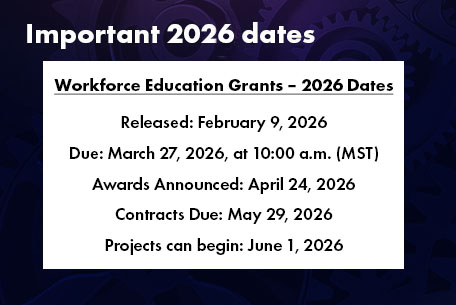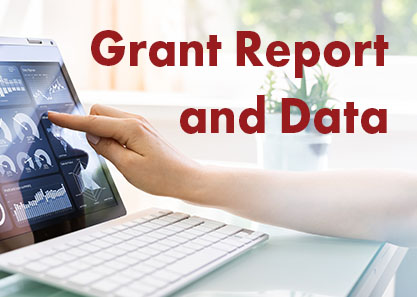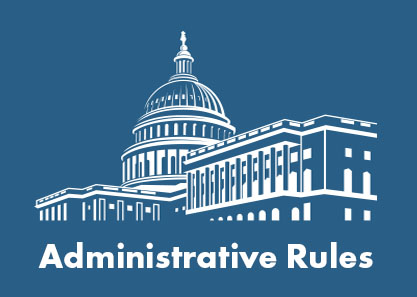Workforce Education Grants
In 2013, the South Dakota Legislature established the Workforce Education Fund through SB 235. Part of that fund was designated to provide grants for Career & Technical Education (CTE) programs in secondary schools.
The Workforce Education Grants provide school districts and private, nonprofit entities who provide specialized training in South Dakota the opportunity to make transformative change in career and technical education programs. High quality CTE programs give students the knowledge, skills and experiences to be well prepared for postsecondary education and the workforce. Partnerships among secondary education, postsecondary education, and business & industry lay the foundation for modern CTE programs.


2026 WEG LEA Guidance 2026 WEG Nonprofit Guidance WEG Budget Sheet Example Budget Tracking Template

Current & Past Recipients
| Recipient | Project | Award amount |
|---|---|---|
| Burke School District | Purchase industry grade equipment and construct a new CTE addition to enhance the AFNR cluster | $225,000 |
| Harrisburg School District | Enrich the Education & Training and Human Services clusters by establishing a childcare and early learning center serving as a CTE working lab | $218,284 |
| Recipient | Project | Award amount |
|---|---|---|
| Custer School District | Construction of a CTE addition to expand current space | $225,000 |
| Huron School District | Construction of a CTE addition to expand current space | $225,000 |
| Recipient | Project | Award amount |
|---|---|---|
| Edgemont School District | Purchase heavy equipment simulators for architecture and construction program | $84,957.50 |
| Parker School District | Construction of a CTE addition to expand current space | $225,000 |
| Sioux Falls School District | Equipment to support the animal husbandry and veterinary science technical training program | $62,275.00 |
| Wall School District | Construction of a CTE addition to expand current space | $225,000.00 |
| Woonsocket School District | Construct an addition for ag, food and natural resources; architecture and construction; and manufacturing | $225,000.00 |
| Recipient | Project | Award amount |
|---|---|---|
| Belle Fourche School District | Purchase heavy equipment simulators to enhance Architecture and Construction and Ag, Food, and Natural Resources programs | $98,575 |
| Bon Homme School District | Construction of a CTE lab to expand current space | $225,000 |
| Bridgewater-Emery School District | Construction of a new CTE building | $225,000 |
| Brookings School District | Purchase equipment to enhance Health Sciences program | $150,000 |
| Canistota School District | Update and remodel Hospitality program, teacher training | $40,400 |
| Florence School District | Construction of a new building to expand STEM and Ag, Food, and Natural Resources programs | $225,000 |
| Mitchell School District | Purchase equipment to expand Architecture and Construction program | $111,467 |
| Spearfish School District | Construction of a new CTE building | $225,000 |
| Tea Area School District | Build greenhouse and start Ag, Food, and Natural Resources program | $118,500 |
| Recipient | Award amount |
|---|---|
| Brookings School District | $204,000.00 |
| Edmunds Central School District | $142,453.51 |
| Rosholt School District | $225,000.00 |
| Mitchell School District | $118,791.24 |
| Recipient | Award amount |
|---|---|
| Canton School District | $60,000.00 |
| Huron School District | $225,000.00 |
| McCook School District | $57,945.00 |
| Mitchell School District | $56,290.35 |
| Recipient | Award amount |
|---|---|
| Dell Rapids School District | $11,661.34 |
| Deubrook Area School District | $16,625.00 |
| Harrisburg School District | $225,000.00 |
| Menno School District | $225,000.00 |
| Mitchell School District | $72,086.48 |
| Rapid City Area School District | $225,000.00 |
| Sioux Falls Catholic Schools (O'Gorman) | $91,028.90 |
| Tea Area School District | $225,000.00 |
| Recipient | Award amount |
|---|---|
| Estelline School District | $150,000.00 |
| Meade School District | $22,000.00 |
| Milbank School District | $44,424.00 |
| Mitchell Area Development | $79,984.00 |
| Mitchell School District | $46,429.00 |
| RTEC, Inc. | $45,540.00 |
Frequently Asked Questions
A: The Workforce Education Grants will fund a wide variety of projects. Several sources are available to spark ideas:
- Check out the 2021 Workforce Education Report for different projects, small and large, that transformed CTE programs, built partnerships with businesses and neighbor school districts, and connected students to postsecondary programs.
- SD Administrative Rule 24:10:47:03 outlines eligible Workforce Education Grant projects:
- Evaluation for alignment to postsecondary education and workforce demands;
- Development of career pathways or programs of study;
- Development of career guidance or work-based learning programs;
- Educator training;
- Facilities;
- Equipment; or
- Instructional materials.
- SD Administrative Rule 24:10:47:04 describes the areas which will receive scoring preference:
- A project evaluating local career and technical education systems for the purposes of redesigning approved secondary CTE programs;
- An innovative project demonstrating alignment to postsecondary education and South Dakota workforce needs and including work-based learning, dual or concurrent credit courses and any applicable CTSO;
- A project which includes collaboration between multiple secondary schools;
- A project demonstrating partnerships with postsecondary education and business or industry;
- A project including industry-grade practices, equipment, and student certifications;
- A project integrating academic content, work-readiness skills, and entrepreneurship education;
- A project increasing access to and support for approved secondary CTE programs in rural areas;
- A project including plans for sustainability; and
- A project which supports the retention of highly effective teachers, career counselors, and administrators for approved secondary CTE programs.
A: Yes, systemic efforts to improve CTE programs, including career development and work-based learning, are encouraged. All project elements in the application must be coordinated and justified to meet the purpose of the Workforce Education Grants: support and align secondary school CTE systems with South Dakota's postsecondary education programs and workforce needs, developing the state’s talent pipeline for workforce development and economic growth. Projects must serve students in middle and/or high school and be aligned to a currently approved CTE program or a program for which the districts intends to seek approval.
A: Yes, the grant project can include transportation costs for postsecondary education and business partnership activities. It is critical that applications also identify plans for sustainability. In other words, how will the postsecondary education visits or business and industry activities continue after the grant funds end?
A: Match, whether from in-kind contributions or monetary donations, can come from a variety of sources. In-kind contributions might include time that industry professionals donate to advising, mentoring, or coaching for the project; equipment donated by a business or community organization; a portion of staff or administrator compensation that can be connected to the grant project; etc. Monetary contributions might come from donations, grants acquired during the Workforce Education Grant award period, investments made by the school district etc. All match funding must occur during the grant period.
A: Yes. Match, whether in-kind or monetary, may come from multiple sources. All match sources, however, must be necessary and reasonable for accomplishment of the project objectives, provided for in the approved budget, and the values for the contributions of services and property must be established as they would for federal grants in accordance with the CFR Part 200 Uniform Guidance 20.306. Match may be documented only in the grant award period.
A: Time and effort logs must be kept during the grant period to accurately track the percent of staff time devoted to the grant project. In addition, the total time invested over the life of the project must be documented and in accordance with the CFR Part 200 Uniform Guidance 220.306. Keep in mind, this match is only eligible when the staff is necessary and reasonable for the accomplishment of the project's objectives.
A: Yes. All state grant revenues must be coded to 3129 (restricted state grants). Match sources will also need to be coded appropriately. For specific questions on financial tracking or reporting, contact:
- Krislyn Norgaard, Division of Finance & Management
Krislyn.Norgaard@state.sd.us
605.773.4748 - Bobbi Leiferman, Division of Finance & Management
Bobbi.leiferman@state.sd.us
607.773.5407
A: Due to the wide variety of possible projects under the Workforce Education Grants and the many nuances of federal regulations, applicants should become familiar with the requirements placed on federal grant expenditures or seek counsel from an expert in the school district if the match sources include a federal grant(s). The regulations outlined in the Code of Federal Regulations, TITLE 2 - Grants and Agreements provide relevant guidance. The Strengthening Career and Technical Education for the 21st Century Act of 2018 also details the eligibility and uses of funds for those dollars. To discuss specific situations related to the match sources for the Workforce Education Grant, contact Jamie Boettcher, 605.220.3441.
- General questions about the Workforce Education Grants can be directed to Jamie Boettcher at (605) 220-3441.
- Any questions on financial accounting related to grant awards, contact Bobbi Leiferman at (605) 773-5407.


